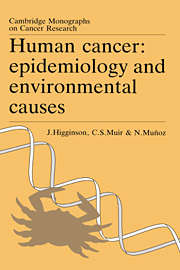Book contents
- Frontmatter
- Contents
- Contributors
- Preface
- Acknowledgements
- Historical introduction
- PART I Epidemiological methods
- PART II Causative factors in human cancer
- PART III Legal and ethical considerations
- 20 Legal and regulatory issues in cancer epidemiology
- 21 Ethical responsibilities of the epidemiologist
- PART IV Introduction: total and specific site epidemiology
- PART V Buccal cavity
- PART VI Digestive system
- PART VII Respiratory system
- PART VIII Bone and soft tissue
- PART IX Skin
- PART X Breast and genitourinary system
- PART XI Eye and nervous system
- PART XII Thyroid and other endocrine glands, lymphoid and hematopoietic system
- PART XIII Cancers in children and multiple primary cancers
- Conclusions
- Appendix 1 Cancer statistics
- Appendix 2 A glossary of epidemiological terms
- Appendix 3 Acronyms and abbreviations
- Supplement
- Index
20 - Legal and regulatory issues in cancer epidemiology
Published online by Cambridge University Press: 03 May 2010
- Frontmatter
- Contents
- Contributors
- Preface
- Acknowledgements
- Historical introduction
- PART I Epidemiological methods
- PART II Causative factors in human cancer
- PART III Legal and ethical considerations
- 20 Legal and regulatory issues in cancer epidemiology
- 21 Ethical responsibilities of the epidemiologist
- PART IV Introduction: total and specific site epidemiology
- PART V Buccal cavity
- PART VI Digestive system
- PART VII Respiratory system
- PART VIII Bone and soft tissue
- PART IX Skin
- PART X Breast and genitourinary system
- PART XI Eye and nervous system
- PART XII Thyroid and other endocrine glands, lymphoid and hematopoietic system
- PART XIII Cancers in children and multiple primary cancers
- Conclusions
- Appendix 1 Cancer statistics
- Appendix 2 A glossary of epidemiological terms
- Appendix 3 Acronyms and abbreviations
- Supplement
- Index
Summary
Introduction
In recent years, epidemiological evidence has become of increased importance in the law courts, notably in the United States, in relation to regulatory and toxic tort cases in a number of health related areas (Barnard, 1989). Accordingly, the epidemiologist may be called upon to explain the nature and limitations of studies on human disease and their causes, including the relation between environment and cancer. Such issues have become the subject of considerable legal controversy since epidemiological opinions can seldom be absolute and often contain inherent uncertainties (Huber, 1985; Thomas, 1983).
Certain issues of specific concern to the cancer epidemiologist are outlined briefly in this chapter, largely in terms of experience in the United States. The reader is referred to the reviews of Black and Lillienfeld (1984) and Schwartzbauer & Shindell (1988) for more in depth discussion.
Regulatory issues
Over the last half century, an important aspect of public health policy has been directed to reducing the cancer burden through regulatory control of potential chemical carcinogens present in the work-place or the ambient environment. In many industrial countries in Europe, recommended or compulsory standards and regulations are established by relevant ministries and/or health officials and, more recently, the European Economic Community (EEC). In the USA, such regulations are usually put forward by agencies such as the FDA, EPA, and OSHA which rely on data from various disciplines including epidemiology. In addition, other non-health issues may be taken into consideration such as technical feasibility.
- Type
- Chapter
- Information
- Human CancerEpidemiology and Environmental Causes, pp. 217 - 224Publisher: Cambridge University PressPrint publication year: 1992

